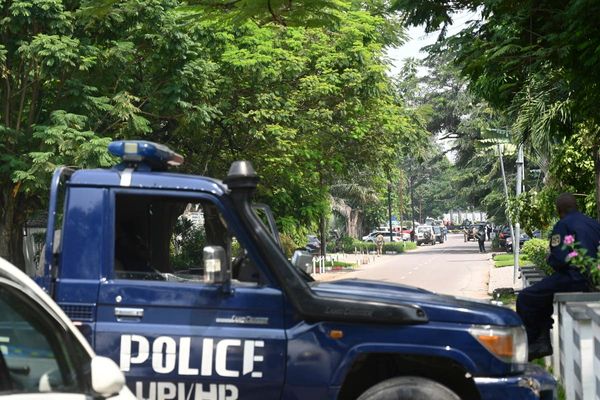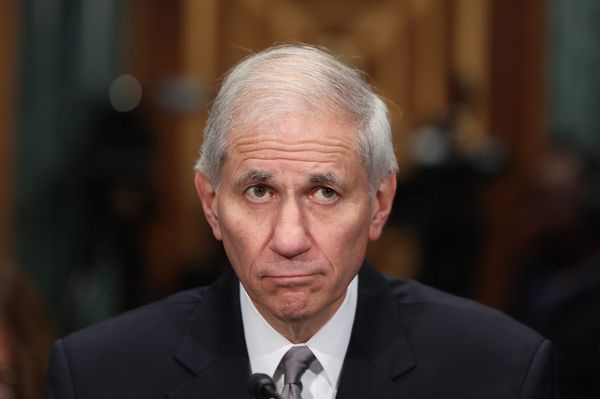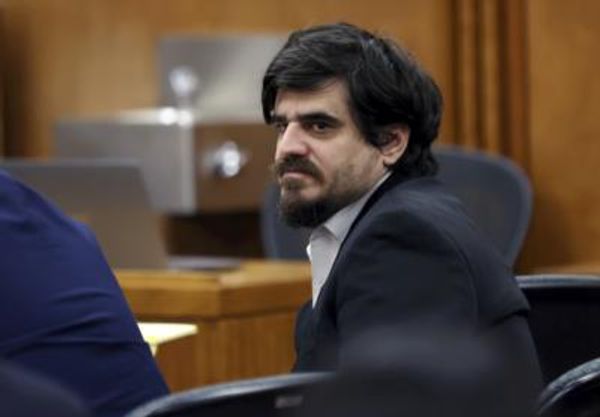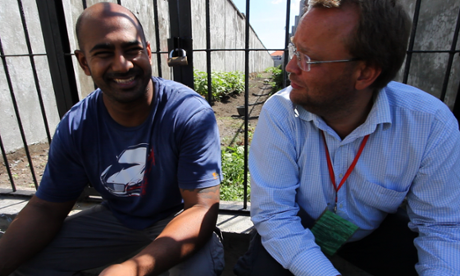
While Bali Nine member Myuran Sukumaran waits to hear the date of his execution, he continues to hold art classes for his fellow prisoners at Kerobokan prison.
While waiting to hear if he and fellow drug trafficker Andrew Chan would be allowed one last review of their case, Sukumaran gave his friend, Norwegian academic Øivind Klungseth Zahlsen, a list of people he believes can carry on the art studio for him.
Zahlsen does not like to think of this list.
Speaking in the days before the appeal was rejected, he told Guardian Australia he was still holding out hope that the man he now calls a friend will be spared, and the work he’s done to improve the daily lives of prisoners inside Kerobokan will spread across the Indonesian prison system.
“For me this is losing a very good friend,” Zahlsen tells Guardian Australia in Seminyak.
“He wants to live, he wants to fight for living, and a place in jail for life he had accepted. A life in jail is something he accepts. He can do good here.”
When the Indonesian president, Joko Widodo, denied his appeal for clemency in January, Sukumaran told Zahlsen that day.
“He was devastated, but he doesn’t really show it. Last time I met him he tried to be the good guy for everyone but this time he was shaking. I wouldn’t say he’s a tough guy, not like that. He’s a guy who is always very humble,” says Zahlsen.
Zahlsen took the Norwegian ambassador, Stig Traavik, through Sukumaran’s art studio last Thursday. More diplomatically neutral than countries like Australia, Norway is actively advocating for death row prisoners.
“Our ambassador was so touched by this, not just the quality of the paintings but of the whole scenario, that he decided to ask about buying one of the pictures, but got it as a gift,” says Zahlsen.
“To me even, with all the hustle and bustle in daily life, I come in to the prison and it is a kind of contemplative atmosphere that actually helps me.”
Zahlsen recognises the strangeness that he finds peace inside a prison.
The goal of the art studio is to keep prisoners away from the criminality inside Kerobokan jail, he said, and to give them a focus. Prisoners must be drug free before Sukumaran allows them to attend.
Videos of the art classes seen by Guardian Australia show mostly Indonesian prisoners – some painfully young – working at their art with care, encouraged by Sukumaran and visiting prison officials.
The classes are so popular that many former prisoners return to take them long after they are released from Kerobokan.
There is talk about replicating it across the country, and while Zahlsen would like to see that it would also “leave a bitter taste”.
“This is like taking the life of the architect whilst admiring the building,” he said. “That, I think, is another very, very sad part of this.”
The plea is one that has been echoed by Australian artists and friends of Sukumaran, Ben Quilty and Matt Sleeth.
Quilty and Sleeth ran one of the long-ago-scheduled workshops with Sukumaran on Tuesday.
“The rehabilitation has been such a success and the authorities in the jail have had such success in rehabilitating its prisoners, now it would be real shame to end that rather than celebrate that,” said Sleeth outside the prison.
“It’s my belief the workshop helps the other prisoners, to help build skills in the jail and to further rehabilitation,” said Quilty.
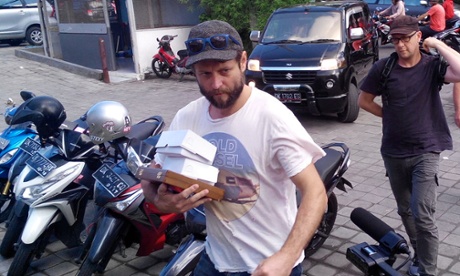
Through the Gateway college in Bali, Zahlsen and colleagues – including the director of studies, Ivar Schou – have taken more than 800 Norwegian students to the prison, mostly to an annual art auction. The money raised from art sales is “more than enough to feed both men for many years”, says Zahlsen.
Schou, who has lived in Bali for the past 10 years, has developed a regular philosophy class with Sukumaran for prisoners. He, like so many others, now calls the Australian his friend.
“With Myuran it is difficult to think about his case because he is still alive and is so productive and so pro-social and doing things all the time in the prison,” Schou tells Guardian Australia from Norway. “He was blooming in prison, in a way.”
The pair have discussed Sukumaran’s death sentence.
“Last time I was there in January and we were talking about how we felt, because now he knew he could be shot any time,” he said. “We talked about his feelings and his thoughts and what do you think about when you know someone can grab you, isolate you for three days and shoot you. He told me it was important to talk about this.”
Schou believes Sukumaran has “always been full of empathy” but was naive when he embarked on the smuggling attempt.
“For him it was money. He saw all the guys around him having the beautiful women and cars and he was naive,” says Schou.
“He thought about it like business, but didn’t think about the consequences regarding how it would affect other people who would suffer because of this.
“I think people have to understand that these people are humans and not evil … If he can be spared, if we can save his life, he will be useful for so many people.”
Although his focus has been on his friend, Schou opposed the death penalty categorically.
“Of course I am angry at this kind of system because the states are supposed to be better than individuals,” he said.
Zahlsen has met Andrew Chan only a couple of times; his most vocal Bali supporters come from the Denpasar C3 church. An SBS reporter, Mark Davis, commented in 2014 that Chan seemed to have undergone the more dramatic transformation.
On Saturday John and Made Stevens were among church members handing out flyers and stickers to passers-by. John Stevens said some knew of Chan and Sukumaran. Others did not, and even those who had heard of the case did not know the extent of the rehabilitation of the two men.
“For those who understood, there’s probably some agreement in the sense they know people are in jail and they know people are on death row but they don’t know that people have been rehabilitated,” he told Guardian Australia.
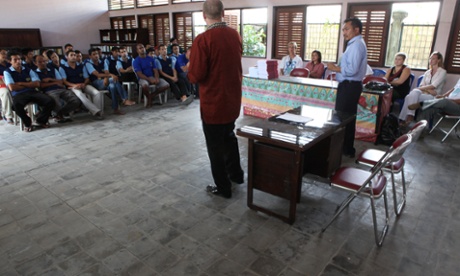
“Often people’s perceptions when someone has been in jail for a crime – if you’ve known the rehabilitation of these people it’s a bit different. How do you explain that to a country?”
Chan’s former lawyer, Nyoman Sudiantara, also advocates for him, and has expressed interest in the art and philosophy programs.
Nyoman represented Chan in earlier legal proceedings, before appeals progressed to the PK level, but the pair still talk.
Nyoman is torn; as someone who has devoted his career to the law but also a friend of Chan’s, it is difficult to reconcile what is happening.
“For the lawyer, I’m really sad with the situation,” he said. “But, on the other side, we lawyers must also appreciate our regulation. Normally, for my mind, this is not a good situation. Not good psychologically for me. I’m really conflicted,” he tells Guardian Australia in Denpasar.
“Our president now, Mr Joko Widodo, says now the impact of the drugs is very very dangerous now, you can see it in our high schools in Bali, for example.”
Nyoman hopes the death penalty will be abolished in the near future. “In my mind also, nobody can make anybody dead except up there,” he said, pointing to the heavens.
Nyoman is in the minority in Indonesia, where support for the death penalty is reportedly about 75%.
Despite the popular support, however, there is a striking variation of supporters for the Australian pair, including Indonesians like Nyoman and a former Kerobokan prison governor, Siswanto, who praised their behaviour and controversially told the court in 2010 he hoped their death sentences would be commuted.
More recently, current and former judges have spoken out about the uselessness of the death penalty as a deterrent. Maruarar Siahaan, who sat on the 2007 constitutional court panel to hear the Australian men’s appeal, put the blame at the feet of poor enforcement for continuing drug crime.
“When the opportunity to escape detection is high, the threat of the death penalty won’t scare those who are in business of drugs,” he told AAP.
Balinese people know of the case. Taxi drivers will ask about the Bali Nine, but invariably it seems to be part of the conversation to be had with visiting Australians.
Enthusiasm is high for ridding the country of drugs, which Jokowi says kill 18,000 Indonesian people each year. Reliable statistics are difficult to come by, but even at highest estimations the rate is on par with Australia, Fairfax reported last week.
Puri Kencana Putri, head of research bureau at Indonesian human rights group KontraS said the executions would not have any effect on the drug trade.
The widespread idea of the death penalty “demonstrated a profound signal that the Indonesian government doesn’t have any roadmap enough to resolve the root cause of the illicit drug trade in Indonesia,” the statement continued.
She said there was no transparency or evaluation of the Indonesian narcotics agency (BNN), which was established in 2002.
“Yes the executions are sad, but the narcotics are very bad, and we must get rid of them in Indonesia,” Guardian Australia has been told more than once.
But there is still a sense the killings are wrong, and the Balinese governor does not want the executions to take place on his island, for fear of the bad karma it will create.
The attention around Sukumaran and Chan is much bigger news in Australia. An English language paper, the Jakarta Post, follows developments and has in recent days published varying analyses, from calls for abolition to accusations of hypocrisy against Australia for campaigning for mercy only for its own people.
Late on Wednesday afternoon the Denpasar district court rejected Sukumaran and Chan’s applications for a second judicial review. In a cruel twist, the Indonesian minister of law and human rights said a new regulation to be issued in a few months time would allow multiple judicial reviews, but until then only one was permitted.
A few months is too late for the two Australians, whom Jokowi has said will be in the next group of executions. Just 72 hours notice has to be given before the men are transported to the execution site and stood in front of a firing squad.
